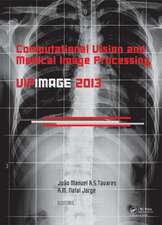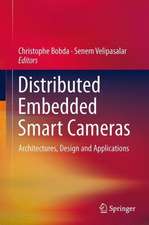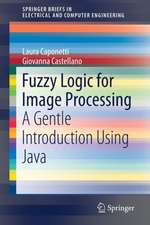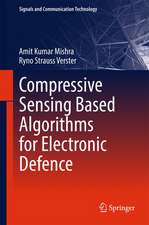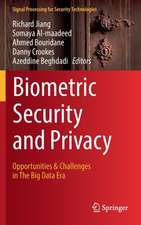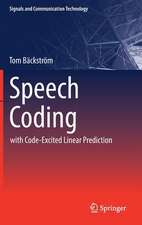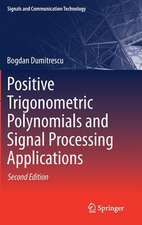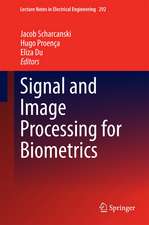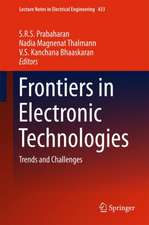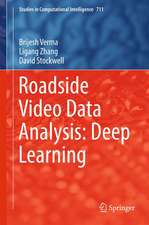Geosynchronous SAR: System and Signal Processing
Autor Teng Long, Cheng Hu, Zegang Ding, Xichao Dong, Weiming Tian, Tao Zengen Limba Engleză Paperback – feb 2019
| Toate formatele și edițiile | Preț | Express |
|---|---|---|
| Paperback (1) | 640.71 lei 6-8 săpt. | |
| Springer Nature Singapore – feb 2019 | 640.71 lei 6-8 săpt. | |
| Hardback (1) | 787.61 lei 6-8 săpt. | |
| Springer Nature Singapore – 4 mai 2018 | 787.61 lei 6-8 săpt. |
Preț: 640.71 lei
Preț vechi: 753.77 lei
-15% Nou
Puncte Express: 961
Preț estimativ în valută:
122.60€ • 128.35$ • 101.44£
122.60€ • 128.35$ • 101.44£
Carte tipărită la comandă
Livrare economică 05-19 aprilie
Preluare comenzi: 021 569.72.76
Specificații
ISBN-13: 9789811339288
ISBN-10: 9811339287
Pagini: 304
Ilustrații: XII, 290 p. 153 illus., 131 illus. in color.
Dimensiuni: 155 x 235 x 16 mm
Greutate: 0.43 kg
Ediția:Softcover reprint of the original 1st ed. 2018
Editura: Springer Nature Singapore
Colecția Springer
Locul publicării:Singapore, Singapore
ISBN-10: 9811339287
Pagini: 304
Ilustrații: XII, 290 p. 153 illus., 131 illus. in color.
Dimensiuni: 155 x 235 x 16 mm
Greutate: 0.43 kg
Ediția:Softcover reprint of the original 1st ed. 2018
Editura: Springer Nature Singapore
Colecția Springer
Locul publicării:Singapore, Singapore
Cuprins
Introduction to GEO SAR.- System analysis and design.- Algorithm for GEO SAR imaging processing.- Atmospheric progation effects.- GEO SAR InSAR/DInSAR.- 3D deformation measurement.- GNSS experiment validation.- Summary and prospect.
Notă biografică
Teng Long is a full professor at the School of Information and Electronics (SIE), Beijing Institute of Technology (BIT), China. He is a Fellow of the Institute of Engineering and Technology (IET) and of the Chinese Institute of Electronics (CIE). His research interests include radar systems, embedded real-time digital signal processing, and remote sensing signal processing. He has published 2 academic books, over 200 refereed journal and conference papers, and holds over 50 national invention patents in China. He has received 1 Second Prize of National Technology Invention Award, 2 First Prizes and 4 Second Prizes of Ministerial Awards of Technological Invention and Progress, the National Top Tier Talent Award, National High-level Personnel of Special Support Program (Ten Thousand Talent Plan), Yangtze River Scholar Distinguished Professor, and the Distinguished Young Scholar Fund of the National Natural Science Foundation (NNSF).
Zegang Ding is a professor at the SIE, BIT, Beijing, China. His main research interests are in the system design and image formation for spaceborne SAR, as well as information processing for airborne SAR. He has published more than 30 refereed journal and conference papers, and holds 20 national invention patents in China.
Weiming Tian is a lecturer at the SIE, BIT, Beijing, China. His research interests include high-resolution SAR systems and signal processing technology, as well as ground differential interferometry SAR. He has published more than 20 academic papers.
Cheng Hu is a full professor at theSIE, BIT, Beijing, China. He is an IET Fellow and IEEE senior member and senior member of CIE. His research interests include geosynchronous synthetic aperture radar (GEO SAR), bistatic SAR, ground-based SAR, and forward scattering radar. He has published more than 120 refereed journal and conference papers, and holds 30 national invention patents in China. He was a recipient of the best paper awards of the IET International Radar Conference 2013 and the IEEE International Radar Conference 2011, and the best poster awards in Land Remote Sensing of DRAGON 3 Program in 2012.
Xichao Dong is an assistant professor at theSIE, BIT, Beijing, China. His chief research interests are in GEO SAR and microwave remote sensing. He has published more than 40 refereed journal and conference papers. He was a recipient of the IEEE CIE International Radar Conference Excellent Paper Award in 2011 and the Chinese Institute of Electronics Youth Conference Poster Award in 2014.
Tao Zeng is a full professor at the SIE, BIT, Beijing, China. An IET Fellow, his work primarily focuses on bistatic and multistatic radar. He has published more than 100 refereed journal and conference papers, and holds 70 national invention patents in China. He has received 1 Second Prize of National Technology Invention Award and the Distinguished Young Scholar Fund of the NNSF.
Textul de pe ultima copertă
This book chiefly addresses the analysis and design of geosynchronous synthetic aperture radar (GEO SAR) systems, focusing on the algorithms, analysis, methods used to compensate for ionospheric influences, and validation experiments for Global Navigation Satellite Systems (GNSS). Further, it investigates special problems in the GEO SAR context, such as curved trajectories, the Earth’s rotation, the ‘non-stop-and-go’ model, high-order Doppler parameters, temporal-variant ionospheric errors etc. These studies can also be extended to SAR with very high resolution and long integration time. Given the breadth and depth of its coverage, scientists and engineers in SAR and advanced graduate students in related areas will greatly benefit from this book.
Caracteristici
Presents complete analysis and design procedures for geosynchronous synthetic aperture radar (GEO SAR) systems Offers step-by-step tutorials to quickly familiarize readers with geosynchronous SAR Illustrates the analysis of and compensation methods for spatial-temporal variant ionospheric influences on GEO SAR Comprehensively summarizes the imaging algorithms for GEO SAR Employs global navigation satellite systems (GNSS) experiments to validate the feasibility of GEO SAR focusing and interferometry

